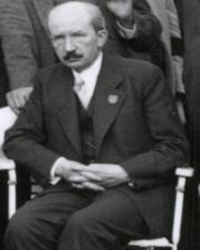Walther Bothe (1891-1957) was a German nuclear physicist who constructed Germany’s first cyclotron and received the 1954 Nobel Prize in Physics along with Max Born.
EARLY YEARS
Bothe was born in Oranienburg, Germany in 1891. He studied at the University of Berlin from 1908-1912. In 1913 he began research under Max Planck in the Laboratory for Radioactivity at the Reich Physical Technical Institute (PTR), where he received his Ph.D. in 1914. Bothe continued to research at the lab until 1930. During this time, he worked with Hans Geiger, became a professor at the university, and later from 1927-1930 served as the Director of the Laboratory for Radioactivity.
After receiving his Ph.D., Bothe served in German military during World War I. He was captured and interned by the Russians in Siberia. While imprisoned, Bothe learned Russian and continued his research in theoretical physics. He returned to Germany in 1920.
In 1930, Bothe became a professor of physics at the University of Giessen, where he also served as director of the university’s Physics Department. Bothe and Herbert Becker’s research and bombardment of beryllium contributed to Sir James Chadwick’s 1932 discovery of the neutron. Shortly thereafter, he went on to teach at the University of Heidelberg. There he was appointed Director of the Physical and Radiological Institute. However, Hitler’s distrust of theoretical and atomic physics, manifested in the Deutsche Physik movement, led to Bothe’s dismissal from the University. Instead, Bothe became the Director for the Institute for Physics at the Kaiser Wilhelm Institute for Medical Research.
WWII AND THE GERMAN ATOMIC BOMB PROJECT
As one of the leading German scientists at the outbreak of the Second World War, Bothe worked on the secret German atomic bomb program as a member of the “Uranium Club” or Uranverein alongside prominent scientists such as Werner Heisenberg and Kurt Diebner. He was responsible for the fundraising, planning, and construction of Germany’s first operational cyclotron. Under his direction, the cyclotron was completed in 1943.
Additionally, the results of Bothe’s experiments led him and other German scientists to erroneously conclude that graphite was an unsuitable component in the development of an atomic bomb. This led the Uranium Club to revert to using heavy water, sourced from the Norsk Hydro plant in Norway, a much less efficient and scarce resource.
LATER YEARS
After the war, Bothe continued his work at the Kaiser Wilhelm Institute. In 1953, he received the Max Planck Medal, the highest award of the German Physical Society, for his contributions to theoretical physics. The following year, in 1954, Bothe was awarded the Nobel Prize in Physics. Bothe passed away on February 8, 1957 at the age of 66 in Heidelberg, West Germany.
For more information on Bothe’s scientific research and achievements, visit the Nobel Prize website.





